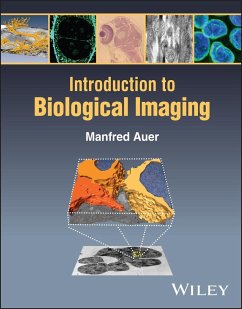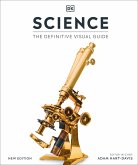Manfred Auer (China Southeast University in Nanjing)
Introduction to Biological Imaging
Manfred Auer (China Southeast University in Nanjing)
Introduction to Biological Imaging
- Broschiertes Buch
- Merkliste
- Auf die Merkliste
- Bewerten Bewerten
- Teilen
- Produkt teilen
- Produkterinnerung
- Produkterinnerung
Discover what biological imaging is able to accomplish in this up-to-date textbook One of the fundamental goals of biology is to understand how living organisms establish and maintain their spatiotemporal organization of the biochemical, cell biological and developmental biology processes that sustain life. Biological systems are inherently complex with a large number of components needed to sustain cellular function. In order to understand any complex system, one must determine its composition by identifying the components it is made of, how each of these components function and carry out…mehr
Andere Kunden interessierten sich auch für
![Solving Problems with Microscopy Solving Problems with Microscopy]() Brooke W. KammrathSolving Problems with Microscopy147,99 €
Brooke W. KammrathSolving Problems with Microscopy147,99 €![Micro Life Micro Life]() DKMicro Life26,99 €
DKMicro Life26,99 €![Practical Forensic Microscopy Practical Forensic Microscopy]() Barbara P. Wheeler (Eastern Kentucky University)Practical Forensic Microscopy122,99 €
Barbara P. Wheeler (Eastern Kentucky University)Practical Forensic Microscopy122,99 €![Science Science]() DKScience30,99 €
DKScience30,99 €![Timelines of Science Timelines of Science]() DKTimelines of Science21,99 €
DKTimelines of Science21,99 €![In Vivo EPR (ESR) In Vivo EPR (ESR)]() Lawrence J. Berliner (Hrsg.)In Vivo EPR (ESR)166,99 €
Lawrence J. Berliner (Hrsg.)In Vivo EPR (ESR)166,99 €![Basic Bioscience Laboratory Techniques Basic Bioscience Laboratory Techniques]() Philip L.R. Bonner (Nottingham Trent University)Basic Bioscience Laboratory Techniques42,99 €
Philip L.R. Bonner (Nottingham Trent University)Basic Bioscience Laboratory Techniques42,99 €-
-
-
Discover what biological imaging is able to accomplish in this up-to-date textbook One of the fundamental goals of biology is to understand how living organisms establish and maintain their spatiotemporal organization of the biochemical, cell biological and developmental biology processes that sustain life. Biological systems are inherently complex with a large number of components needed to sustain cellular function. In order to understand any complex system, one must determine its composition by identifying the components it is made of, how each of these components function and carry out their specific task, and how they interact with one another to function together. To grasp the link of such changes to physiological cell and tissue function and/or pathogenesis/disease progression, we need to understand how modifications alter macromolecular function, macromolecular interactions, and/or spatiotemporal distribution and overall supramolecular structural organization. Biological imaging holds the key to understanding spatiotemporal organization, and will thus be increasingly important for the next generations of biological and biochemical researchers. Introduction to Biological Imaging provides the first comprehensive textbook surveying this subject. It elucidates the fundamental principles underlying the capture and production of bioimages, the requirements of image analysis and interpretation, and some key problems and solutions in bioimaging. It includes everything experimental biologists need to incorporate appropriate bioimaging solutions into their work. Introduction to Biological Imaging readers will also find: Coverage of all major types of biological imaging, including medical imaging, cellular imaging, macromolecular imaging, and moreAdvice on preparing samples for various imaging methodsSpecific examples in each chapter connecting bioimaging process to the production of real experimental data Introduction to Biological Imaging is a valuable introduction for undergraduate or graduate students in courses relating to bioimaging, as well as scientists and researchers in the biological and medical fields who want a one-stop reference for the full range of imaging techniques.
Hinweis: Dieser Artikel kann nur an eine deutsche Lieferadresse ausgeliefert werden.
Hinweis: Dieser Artikel kann nur an eine deutsche Lieferadresse ausgeliefert werden.
Produktdetails
- Produktdetails
- Verlag: John Wiley & Sons Inc
- Seitenzahl: 352
- Erscheinungstermin: 2. Mai 2024
- Englisch
- Abmessung: 274mm x 215mm x 20mm
- Gewicht: 978g
- ISBN-13: 9781119705949
- ISBN-10: 1119705940
- Artikelnr.: 69432122
- Herstellerkennzeichnung
- Produktsicherheitsverantwortliche/r
- Europaallee 1
- 36244 Bad Hersfeld
- gpsr@libri.de
- Verlag: John Wiley & Sons Inc
- Seitenzahl: 352
- Erscheinungstermin: 2. Mai 2024
- Englisch
- Abmessung: 274mm x 215mm x 20mm
- Gewicht: 978g
- ISBN-13: 9781119705949
- ISBN-10: 1119705940
- Artikelnr.: 69432122
- Herstellerkennzeichnung
- Produktsicherheitsverantwortliche/r
- Europaallee 1
- 36244 Bad Hersfeld
- gpsr@libri.de
Manfred Auer, PhD, is Professor in the School of Biological Sciences and Medical Engineering at Southeast University in Nanjing, China. He has decades of research experience in Europe and the US, and is the recipient of honors including an Otto Hahn Award of the Max Planck Society for exceptional PhD thesis (1999), an U.S. Department of Energy Outstanding Mentoring Award (2009), a Berkeley Lab Prize (2012), and a Chinese Ministry of Education Chang Jiang Scholar Chair Professor Award (2022).
Preface xiii
1 Introduction - A Brief History of Imaging 1
1.1 Spatiotemporally Organization of Biological Processes 2
1.1.1 Metabolism 2
1.1.2 Developmental Biology 2
1.1.3 Disease Mechanisms 2
1.2 Why Imaging? 3
1.2.1 A Very Brief History of Cellular Biological Imaging 3
1.2.2 A Very Brief History of Macromolecular Biological Imaging 5
2 Basics of Atomic and Molecular Physics 9
2.1 Matter and Energy 9
2.1.1 Standard Model of Particle Physics 9
2.1.2 Atomic Structure 11
2.1.3 Periodic Table of Elements 16
2.1.4 Transitions of Electrons 17
2.1.5 Molecular Orbitals 17
2.1.6 Forces and Bonds Between Neighboring Atoms 18
2.2 Electromagnetic Spectrum 21
2.2.1 Gamma Rays 22
2.2.2 X-Rays 22
2.2.3 Ultraviolet Radiation 22
2.2.4 Visible Light 22
2.2.5 Infrared Radiation 23
2.2.6 Microwave Radiation 24
2.2.7 Radio Wave Radiation 24
2.3 Interaction of Radiation with Matter 24
2.3.1 High-Energy Photons 24
2.3.2 High-Energy Particles 25
2.3.3 Middle-Energy Photons 25
2.3.4 Low-Energy Photons 26
3 Basics of Optics 33
3.1 Properties of Light 33
3.2 Classical Optics 33
3.3 Interaction of Light with Matter 34
3.3.1 Reflection 34
3.3.2 Refraction 34
3.3.3 Dispersion 35
3.4 Lenses 35
3.5 Numerical Aperture 35
3.6 Scattering 36
3.7 Interference 37
3.8 Diffraction 37
3.9 Airy Disk 39
3.10 Point-Spread Function 39
3.11 Resolution 40
3.12 Aberrations 41
3.13 Polarization 41
3.14 Photoelectric Effect 42
3.15 Valence Electron Transitions 42
3.16 Vibrational and Rotational Transitions 43
3.17 Stimulated Emission 43
4 Basics of Fourier "Math" 45
5 Basics of Imaging and Image Formation 51
5.1 Goals of Imaging 51
5.2 Source of Radiation 52
5.2.1 Gamma-Rays 52
5.2.2 X-Rays 53
5.2.3 UV-Rays/Visible Light Rays/Near-IR Light Rays 53
5.2.4 IR Radiation 55
5.2.5 Microwave Radiation 55
5.2.6 Radio Wave Radiation 55
5.2.7 Particle Radiation 55
5.2.8 Particle Radiation: Electrons 56
5.2.9 Particle Radiation: Positrons 57
5.2.10 Particle Radiation: Alpha-Radiation/Helium Nuclei 57
5.2.11 Particle Radiation: Ion Beams 57
5.2.12 Particle Radiation: Neutrons 57
5.2.13 Particle Radiation: Protons 57
5.3 Beam Collimation 57
5.4 Lenses 58
5.5 Lens-Free Imaging/Near Field Imaging 59
5.6 Signal Detection and Detectors 60
5.6.1 What Are the Different Types of Radiation That Need to Be Detected?
60
5.6.2 Detection of Particle Radiation 61
5.6.3 Detection of Ionizing Electromagnetic Radiation 62
5.6.4 Detection of Non-Ionizing Electromagnetic Radiation 63
5.6.5 Principles of Signal Detection 64
5.7 Modulation-, Contrast-, and Optical-Transfer Function 69
5.8 Field of View, Coverage 70
5.9 Spot-Scan Versus Flood-Beam Imaging 71
5.10 Radiation Damage 72
5.11 Spectroscopic Imaging 72
5.12 Multidimensional and Multi-channel Imaging 73
5.13 Sample Preparation Requirements 75
5.13.1 Macromolecular 3D Structure 75
5.13.2 Subcellular, Cellular, and Tissue 3D Architecture 76
5.13.3 Dynamic Localization of Macromolecules in Cells and Tissues 77
5.13.4 Chemical Inventory of Cells and Tissues 77
5.13.5 Medical Imaging of Tissues and Organs 78
5.14 Labels and Labeling 79
5.15 Label-Free Imaging 81
5.16 2D Versus 3D Imaging 82
5.17 Structural Versus Functional Imaging 85
5.18 Correlative Imaging 85
6 Basics of Image Processing and Image Analysis 87
6.1 Overview 87
6.2 Characteristics of Digital Images 89
6.3 Compression of Image Data 96
6.4 Metadata 98
6.5 Spatial, Temporal and Spectral Resolution 99
6.6 Image Intensity Values 99
6.6.1 Contrast 99
6.6.2 Histogram 100
6.6.3 False-Color Representation and Lookup Tables 101
6.7 Raster Graphics Versus Vector Graphics 101
6.8 Simple Image Processing Operations 102
6.9 Image Restoration 104
6.10 Image Enhancement 104
6.11 Image Reconstruction 109
6.12 Visualization 109
6.12.1 Introduction to Scientific Visualization 109
6.12.2 Visualization Software Examples 113
6.12.3 3D Volume Image Data 114
6.12.4 Visualizing Macromolecular Imaging Data 115
6.12.5 Visualizing Cellular Imaging Data 116
6.12.6 A Few More Points Worth Noting 119
6.13 Image Segmentation 119
6.13.1 Map Density Value- Based Segmentation 120
6.13.2 Manual Segmentation - Creating Regions of Interest 121
6.13.3 Automated Segmentation 122
6.14 Making Changes to Object Selection: Dilation, Erosion, Closing,
Filling Holes 131
6.15 Measurements/Quantitative Analysis 131
7 Techniques - Macromolecular Structure Determination 135
7.1 X-Ray Crystallography 135
7.1.1 Overview 135
7.1.2 Historical Perspective/Milestones 137
7.1.3 Theoretical Background 138
7.1.4 Instrumentation/Experimental Setup 143
7.1.5 Data Collection 146
7.1.6 Data Analysis and Phasing 147
7.1.7 Map Calculation and Model Building 148
7.1.8 Refinement and Validation 148
7.1.9 Visualization 149
7.1.10 Outlook 149
7.2 Macromolecular Cryo-Electron Microscopy 150
7.2.1 Overview 150
7.2.2 Historical Perspective/Milestones 152
7.2.3 Theoretical Background 162
7.2.4 Instrumentation/Experimental Setup 165
7.2.5 Sample Preparation and Data Collection 168
7.2.6 Data Analysis 169
7.2.7 Map Calculation and Resolution Estimates 175
7.2.8 Visualization and Model Building 176
7.3 NMR Spectroscopy 177
7.3.1 Overview 177
7.3.2 Historical Perspective/Milestones 178
7.3.3 Theoretical Background 179
7.3.4 Instrumentation and Experimental Setup 181
7.3.5 Data Collection and Analysis 181
7.4 Small Angle Scattering - SAXS and SANS 184
7.4.1 Small-Angle X-Ray Scattering (SAXS) 184
7.4.2 Small-Angle Neutron Scattering (SANS) 184
7.5 Atomic Force Microscopy (AFM) 185
8 Techniques - Cell and Tissue Architectural Imaging 189
8.1 Overview 189
8.2 Historical Perspective/Milestones 191
8.2.1 Transmission Electron Microscopy (TEM) Imaging 195
8.2.2 Scanning Electron Microscopy (SEM) Imaging 196
8.2.3 Helium Ion Microscopy Imaging 196
8.2.4 X-Ray Microscopy Tomography Imaging 197
8.2.5 Optical/Fluorescence Light Microscopy Imaging 199
8.3 Theoretical Background 199
8.3.1 Contrast Generation in Transmission Electron Microscopy 199
8.3.2 Contrast Generation in Scanning Electron Microscopy (SEM) 200
8.3.3 Contrast Generation in Helium Ion Microscopy (HeIM) 201
8.3.4 Contrast Generation in X-Ray Microscopy Tomography (XRMT) 201
8.3.5 3D Reconstructions of Pleiomorphic Objects 203
8.4 Sample Preparation 205
8.4.1 Electron Microcopy 205
8.4.2 Need for Thin Samples 205
8.4.3 Conventional TEM Sample Preparation 205
8.4.4 Cryogenic EM Sample Preparation 206
8.4.5 Sample Preparation for cryo-XRMT 208
8.5 Instrumentation 208
8.5.1 Radiation Source 209
8.5.2 Electron/Ion/X-Ray Optical System 210
8.5.3 Detectors 211
8.5.4 Specimen Stage 211
8.5.5 Vacuum System 213
8.6 Data Collection and 3D Reconstruction 214
8.6.1 Serial Section TEM 214
8.6.2 Serial Section SEM 215
8.6.3 Serial Block Face SEM 215
8.6.4 Focused Ion Beam (Dual Beam) SEM 215
8.6.5 X-Ray Microscopy Tomography 216
8.7 Data Visualization and Analysis 217
8.7.1 Visualization of Cellular Sceneries 218
8.7.2 Segmentation/Feature Extraction 219
8.7.3 Model Building and (Quantitative) Analysis 221
8.7.4 Deriving Biological Meaning Through Interpretation 222
9 Techniques - Cell and Tissue Characterization and Localization Imaging
225
9.1 Overview 225
9.2 Historical Perspective/Milestones 226
9.2.1 What Is Light? 226
9.2.2 Optical Instruments and Microscopy 228
9.2.3 Application of Microscopy to Biological Samples 230
9.2.4 Fluorescence Microscopy 231
9.3 Theoretical Background 232
9.4 Instrumentation/Experimental Setup 235
9.4.1 Frame, Stage, and Sample Holders 235
9.4.2 Light Source and Illumination 237
9.4.3 Optical Path 238
9.4.4 Detector 239
9.5 Data Collection 241
9.5.1 Choosing the Right Microscopy Technique 241
9.5.2 White Light Imaging 241
9.5.3 Fluorescence Microscopy 243
9.6 Fluorophore Considerations 244
9.6.1 Synthetic Organic Dyes 244
9.6.2 Quantum Dots 246
9.6.3 Immuno-Affinity-Based Labeling 246
9.7 Genetically Encoded Fluorescent Proteins 247
9.7.1 Intrinsically Fluorescent Proteins 247
9.7.2 Photoactivatable Fluorescent Proteins 248
9.7.3 Photoconvertible Fluorescent Proteins 248
9.7.4 Photoswitchable Fluorescent Proteins 248
9.7.5 Extrinsically Fluorescent Proteins 248
9.8 RNA/DNA - Fluorescent Probes 248
9.9 Fluorescent Imaging Types 250
9.10 Detangling the Many Fluorescence Imaging Approaches 250
9.11 Improve Axial Resolution and Reduce Phototoxicity 251
9.11.1 Epifluorescence Microscopy 251
9.11.2 Deconvolution Microscopy 251
9.11.3 Confocal Laser Scanning Microscopy 252
9.11.4 Spinning Disk Confocal Microscope 252
9.11.5 4Pi and Confocal Theta Microscopy 252
9.11.6 Two-Photon Microscopy 253
9.11.7 Single Plane Illumination Microscopy (SPIM) 255
9.11.8 Total-Internal Reflection Fluorescence (TIRF) Microscopy 256
9.12 Superresolution Imaging - Breaking the Resolution Barrier 257
9.12.1 Photoactivation 257
9.12.2 Photoconversion 257
9.12.3 Photoswitching 258
9.13 Superresolution Imaging 258
9.13.1 Single-Molecule Localization Microscopy 258
9.13.2 Patterned Illumination Microscopy 260
9.14 Near-Field Scanning Microscopy 261
9.15 Molecular Dynamics Study of Macromolecules 261
9.15.1 Fluorescence Recovery After Photobleaching (FRAP) Microscopy 261
9.15.2 Fluorescence Loss in Photobleaching (FLIP) Microscopy 262
9.15.3 Fluorescence Speckle Microscopy (FSM) 262
9.15.4 Förster Resonance Energy Transfer Microscopy 262
9.15.5 Fluorescence Lifetime Imaging Microscopy 264
9.16 Visualization 264
9.17 Data Analysis 265
10 Techniques - Chemical Imaging at the Cell and Tissue Level 267
10.1 X-Ray Microanalysis: X-Ray Fluorescence Microscopy (XFM),
Energy-Dispersive X-Ray Spectroscopy (EDX), Wavelength-Dispersive X-ray
Spectroscopy (WDS) 269
10.2 Raman Imaging 271
10.2.1 Overview 271
10.2.2 Theoretical Background 272
10.2.3 Experimental Design 276
10.2.4 Data Analysis 276
10.3 Fourier-Transform Infrared (FTIR) Imaging 277
10.4 Mass Spectrometry 279
10.4.1 Overview 279
10.4.2 Historical Perspective 282
10.4.3 Instrumentation 283
10.4.4 Data Analysis 289
11 Techniques - Tissue and Organ Medical Imaging 291
11.1 Positron Emission Tomography 292
11.2 Computed (Axial) Tomography 294
11.3 Magnetic Resonance Imaging (MRI) 294
11.4 Medical Ultrasound 296
11.5 Bioluminescence 297
11.6 Optical Coherence Tomography 297
11.7 Histology/Histopathology 298
12 The Future of Bioimaging 301
12.1 Future of Macromolecular Imaging 301
12.2 Future of (Sub)Cellular and Tissue Imaging 303
12.2.1 Light Microscopy Versus Electron Microscopy 303
12.2.2 Cryo-Preservation in EM Sample Preparation 304
12.2.3 FIB Milling Sample Preparation 304
12.2.4 Electron Tomography 304
12.2.5 Correlative Light and Electron Microscopy 305
12.2.6 Volume-SEM 305
12.2.7 Helium Ion Microscopy 305
12.2.8 Cryo-Soft-X-Ray Microscopy Tomography 306
12.2.9 Hard-X-Ray Microscopy Tomography 306
12.3 Future of Chemical Imaging 307
12.4 Future of Medical Imaging 307
12.5 Future of Image Processing and Analysis 308
12.6 Future of Multiscale Imaging 310
12.7 Future of Multimodal Imaging - Correlative Imaging 313
12.8 Future of Information Integration - Multiscale, Multimodal, and
Integrated 315
Index 319
1 Introduction - A Brief History of Imaging 1
1.1 Spatiotemporally Organization of Biological Processes 2
1.1.1 Metabolism 2
1.1.2 Developmental Biology 2
1.1.3 Disease Mechanisms 2
1.2 Why Imaging? 3
1.2.1 A Very Brief History of Cellular Biological Imaging 3
1.2.2 A Very Brief History of Macromolecular Biological Imaging 5
2 Basics of Atomic and Molecular Physics 9
2.1 Matter and Energy 9
2.1.1 Standard Model of Particle Physics 9
2.1.2 Atomic Structure 11
2.1.3 Periodic Table of Elements 16
2.1.4 Transitions of Electrons 17
2.1.5 Molecular Orbitals 17
2.1.6 Forces and Bonds Between Neighboring Atoms 18
2.2 Electromagnetic Spectrum 21
2.2.1 Gamma Rays 22
2.2.2 X-Rays 22
2.2.3 Ultraviolet Radiation 22
2.2.4 Visible Light 22
2.2.5 Infrared Radiation 23
2.2.6 Microwave Radiation 24
2.2.7 Radio Wave Radiation 24
2.3 Interaction of Radiation with Matter 24
2.3.1 High-Energy Photons 24
2.3.2 High-Energy Particles 25
2.3.3 Middle-Energy Photons 25
2.3.4 Low-Energy Photons 26
3 Basics of Optics 33
3.1 Properties of Light 33
3.2 Classical Optics 33
3.3 Interaction of Light with Matter 34
3.3.1 Reflection 34
3.3.2 Refraction 34
3.3.3 Dispersion 35
3.4 Lenses 35
3.5 Numerical Aperture 35
3.6 Scattering 36
3.7 Interference 37
3.8 Diffraction 37
3.9 Airy Disk 39
3.10 Point-Spread Function 39
3.11 Resolution 40
3.12 Aberrations 41
3.13 Polarization 41
3.14 Photoelectric Effect 42
3.15 Valence Electron Transitions 42
3.16 Vibrational and Rotational Transitions 43
3.17 Stimulated Emission 43
4 Basics of Fourier "Math" 45
5 Basics of Imaging and Image Formation 51
5.1 Goals of Imaging 51
5.2 Source of Radiation 52
5.2.1 Gamma-Rays 52
5.2.2 X-Rays 53
5.2.3 UV-Rays/Visible Light Rays/Near-IR Light Rays 53
5.2.4 IR Radiation 55
5.2.5 Microwave Radiation 55
5.2.6 Radio Wave Radiation 55
5.2.7 Particle Radiation 55
5.2.8 Particle Radiation: Electrons 56
5.2.9 Particle Radiation: Positrons 57
5.2.10 Particle Radiation: Alpha-Radiation/Helium Nuclei 57
5.2.11 Particle Radiation: Ion Beams 57
5.2.12 Particle Radiation: Neutrons 57
5.2.13 Particle Radiation: Protons 57
5.3 Beam Collimation 57
5.4 Lenses 58
5.5 Lens-Free Imaging/Near Field Imaging 59
5.6 Signal Detection and Detectors 60
5.6.1 What Are the Different Types of Radiation That Need to Be Detected?
60
5.6.2 Detection of Particle Radiation 61
5.6.3 Detection of Ionizing Electromagnetic Radiation 62
5.6.4 Detection of Non-Ionizing Electromagnetic Radiation 63
5.6.5 Principles of Signal Detection 64
5.7 Modulation-, Contrast-, and Optical-Transfer Function 69
5.8 Field of View, Coverage 70
5.9 Spot-Scan Versus Flood-Beam Imaging 71
5.10 Radiation Damage 72
5.11 Spectroscopic Imaging 72
5.12 Multidimensional and Multi-channel Imaging 73
5.13 Sample Preparation Requirements 75
5.13.1 Macromolecular 3D Structure 75
5.13.2 Subcellular, Cellular, and Tissue 3D Architecture 76
5.13.3 Dynamic Localization of Macromolecules in Cells and Tissues 77
5.13.4 Chemical Inventory of Cells and Tissues 77
5.13.5 Medical Imaging of Tissues and Organs 78
5.14 Labels and Labeling 79
5.15 Label-Free Imaging 81
5.16 2D Versus 3D Imaging 82
5.17 Structural Versus Functional Imaging 85
5.18 Correlative Imaging 85
6 Basics of Image Processing and Image Analysis 87
6.1 Overview 87
6.2 Characteristics of Digital Images 89
6.3 Compression of Image Data 96
6.4 Metadata 98
6.5 Spatial, Temporal and Spectral Resolution 99
6.6 Image Intensity Values 99
6.6.1 Contrast 99
6.6.2 Histogram 100
6.6.3 False-Color Representation and Lookup Tables 101
6.7 Raster Graphics Versus Vector Graphics 101
6.8 Simple Image Processing Operations 102
6.9 Image Restoration 104
6.10 Image Enhancement 104
6.11 Image Reconstruction 109
6.12 Visualization 109
6.12.1 Introduction to Scientific Visualization 109
6.12.2 Visualization Software Examples 113
6.12.3 3D Volume Image Data 114
6.12.4 Visualizing Macromolecular Imaging Data 115
6.12.5 Visualizing Cellular Imaging Data 116
6.12.6 A Few More Points Worth Noting 119
6.13 Image Segmentation 119
6.13.1 Map Density Value- Based Segmentation 120
6.13.2 Manual Segmentation - Creating Regions of Interest 121
6.13.3 Automated Segmentation 122
6.14 Making Changes to Object Selection: Dilation, Erosion, Closing,
Filling Holes 131
6.15 Measurements/Quantitative Analysis 131
7 Techniques - Macromolecular Structure Determination 135
7.1 X-Ray Crystallography 135
7.1.1 Overview 135
7.1.2 Historical Perspective/Milestones 137
7.1.3 Theoretical Background 138
7.1.4 Instrumentation/Experimental Setup 143
7.1.5 Data Collection 146
7.1.6 Data Analysis and Phasing 147
7.1.7 Map Calculation and Model Building 148
7.1.8 Refinement and Validation 148
7.1.9 Visualization 149
7.1.10 Outlook 149
7.2 Macromolecular Cryo-Electron Microscopy 150
7.2.1 Overview 150
7.2.2 Historical Perspective/Milestones 152
7.2.3 Theoretical Background 162
7.2.4 Instrumentation/Experimental Setup 165
7.2.5 Sample Preparation and Data Collection 168
7.2.6 Data Analysis 169
7.2.7 Map Calculation and Resolution Estimates 175
7.2.8 Visualization and Model Building 176
7.3 NMR Spectroscopy 177
7.3.1 Overview 177
7.3.2 Historical Perspective/Milestones 178
7.3.3 Theoretical Background 179
7.3.4 Instrumentation and Experimental Setup 181
7.3.5 Data Collection and Analysis 181
7.4 Small Angle Scattering - SAXS and SANS 184
7.4.1 Small-Angle X-Ray Scattering (SAXS) 184
7.4.2 Small-Angle Neutron Scattering (SANS) 184
7.5 Atomic Force Microscopy (AFM) 185
8 Techniques - Cell and Tissue Architectural Imaging 189
8.1 Overview 189
8.2 Historical Perspective/Milestones 191
8.2.1 Transmission Electron Microscopy (TEM) Imaging 195
8.2.2 Scanning Electron Microscopy (SEM) Imaging 196
8.2.3 Helium Ion Microscopy Imaging 196
8.2.4 X-Ray Microscopy Tomography Imaging 197
8.2.5 Optical/Fluorescence Light Microscopy Imaging 199
8.3 Theoretical Background 199
8.3.1 Contrast Generation in Transmission Electron Microscopy 199
8.3.2 Contrast Generation in Scanning Electron Microscopy (SEM) 200
8.3.3 Contrast Generation in Helium Ion Microscopy (HeIM) 201
8.3.4 Contrast Generation in X-Ray Microscopy Tomography (XRMT) 201
8.3.5 3D Reconstructions of Pleiomorphic Objects 203
8.4 Sample Preparation 205
8.4.1 Electron Microcopy 205
8.4.2 Need for Thin Samples 205
8.4.3 Conventional TEM Sample Preparation 205
8.4.4 Cryogenic EM Sample Preparation 206
8.4.5 Sample Preparation for cryo-XRMT 208
8.5 Instrumentation 208
8.5.1 Radiation Source 209
8.5.2 Electron/Ion/X-Ray Optical System 210
8.5.3 Detectors 211
8.5.4 Specimen Stage 211
8.5.5 Vacuum System 213
8.6 Data Collection and 3D Reconstruction 214
8.6.1 Serial Section TEM 214
8.6.2 Serial Section SEM 215
8.6.3 Serial Block Face SEM 215
8.6.4 Focused Ion Beam (Dual Beam) SEM 215
8.6.5 X-Ray Microscopy Tomography 216
8.7 Data Visualization and Analysis 217
8.7.1 Visualization of Cellular Sceneries 218
8.7.2 Segmentation/Feature Extraction 219
8.7.3 Model Building and (Quantitative) Analysis 221
8.7.4 Deriving Biological Meaning Through Interpretation 222
9 Techniques - Cell and Tissue Characterization and Localization Imaging
225
9.1 Overview 225
9.2 Historical Perspective/Milestones 226
9.2.1 What Is Light? 226
9.2.2 Optical Instruments and Microscopy 228
9.2.3 Application of Microscopy to Biological Samples 230
9.2.4 Fluorescence Microscopy 231
9.3 Theoretical Background 232
9.4 Instrumentation/Experimental Setup 235
9.4.1 Frame, Stage, and Sample Holders 235
9.4.2 Light Source and Illumination 237
9.4.3 Optical Path 238
9.4.4 Detector 239
9.5 Data Collection 241
9.5.1 Choosing the Right Microscopy Technique 241
9.5.2 White Light Imaging 241
9.5.3 Fluorescence Microscopy 243
9.6 Fluorophore Considerations 244
9.6.1 Synthetic Organic Dyes 244
9.6.2 Quantum Dots 246
9.6.3 Immuno-Affinity-Based Labeling 246
9.7 Genetically Encoded Fluorescent Proteins 247
9.7.1 Intrinsically Fluorescent Proteins 247
9.7.2 Photoactivatable Fluorescent Proteins 248
9.7.3 Photoconvertible Fluorescent Proteins 248
9.7.4 Photoswitchable Fluorescent Proteins 248
9.7.5 Extrinsically Fluorescent Proteins 248
9.8 RNA/DNA - Fluorescent Probes 248
9.9 Fluorescent Imaging Types 250
9.10 Detangling the Many Fluorescence Imaging Approaches 250
9.11 Improve Axial Resolution and Reduce Phototoxicity 251
9.11.1 Epifluorescence Microscopy 251
9.11.2 Deconvolution Microscopy 251
9.11.3 Confocal Laser Scanning Microscopy 252
9.11.4 Spinning Disk Confocal Microscope 252
9.11.5 4Pi and Confocal Theta Microscopy 252
9.11.6 Two-Photon Microscopy 253
9.11.7 Single Plane Illumination Microscopy (SPIM) 255
9.11.8 Total-Internal Reflection Fluorescence (TIRF) Microscopy 256
9.12 Superresolution Imaging - Breaking the Resolution Barrier 257
9.12.1 Photoactivation 257
9.12.2 Photoconversion 257
9.12.3 Photoswitching 258
9.13 Superresolution Imaging 258
9.13.1 Single-Molecule Localization Microscopy 258
9.13.2 Patterned Illumination Microscopy 260
9.14 Near-Field Scanning Microscopy 261
9.15 Molecular Dynamics Study of Macromolecules 261
9.15.1 Fluorescence Recovery After Photobleaching (FRAP) Microscopy 261
9.15.2 Fluorescence Loss in Photobleaching (FLIP) Microscopy 262
9.15.3 Fluorescence Speckle Microscopy (FSM) 262
9.15.4 Förster Resonance Energy Transfer Microscopy 262
9.15.5 Fluorescence Lifetime Imaging Microscopy 264
9.16 Visualization 264
9.17 Data Analysis 265
10 Techniques - Chemical Imaging at the Cell and Tissue Level 267
10.1 X-Ray Microanalysis: X-Ray Fluorescence Microscopy (XFM),
Energy-Dispersive X-Ray Spectroscopy (EDX), Wavelength-Dispersive X-ray
Spectroscopy (WDS) 269
10.2 Raman Imaging 271
10.2.1 Overview 271
10.2.2 Theoretical Background 272
10.2.3 Experimental Design 276
10.2.4 Data Analysis 276
10.3 Fourier-Transform Infrared (FTIR) Imaging 277
10.4 Mass Spectrometry 279
10.4.1 Overview 279
10.4.2 Historical Perspective 282
10.4.3 Instrumentation 283
10.4.4 Data Analysis 289
11 Techniques - Tissue and Organ Medical Imaging 291
11.1 Positron Emission Tomography 292
11.2 Computed (Axial) Tomography 294
11.3 Magnetic Resonance Imaging (MRI) 294
11.4 Medical Ultrasound 296
11.5 Bioluminescence 297
11.6 Optical Coherence Tomography 297
11.7 Histology/Histopathology 298
12 The Future of Bioimaging 301
12.1 Future of Macromolecular Imaging 301
12.2 Future of (Sub)Cellular and Tissue Imaging 303
12.2.1 Light Microscopy Versus Electron Microscopy 303
12.2.2 Cryo-Preservation in EM Sample Preparation 304
12.2.3 FIB Milling Sample Preparation 304
12.2.4 Electron Tomography 304
12.2.5 Correlative Light and Electron Microscopy 305
12.2.6 Volume-SEM 305
12.2.7 Helium Ion Microscopy 305
12.2.8 Cryo-Soft-X-Ray Microscopy Tomography 306
12.2.9 Hard-X-Ray Microscopy Tomography 306
12.3 Future of Chemical Imaging 307
12.4 Future of Medical Imaging 307
12.5 Future of Image Processing and Analysis 308
12.6 Future of Multiscale Imaging 310
12.7 Future of Multimodal Imaging - Correlative Imaging 313
12.8 Future of Information Integration - Multiscale, Multimodal, and
Integrated 315
Index 319
Preface xiii
1 Introduction - A Brief History of Imaging 1
1.1 Spatiotemporally Organization of Biological Processes 2
1.1.1 Metabolism 2
1.1.2 Developmental Biology 2
1.1.3 Disease Mechanisms 2
1.2 Why Imaging? 3
1.2.1 A Very Brief History of Cellular Biological Imaging 3
1.2.2 A Very Brief History of Macromolecular Biological Imaging 5
2 Basics of Atomic and Molecular Physics 9
2.1 Matter and Energy 9
2.1.1 Standard Model of Particle Physics 9
2.1.2 Atomic Structure 11
2.1.3 Periodic Table of Elements 16
2.1.4 Transitions of Electrons 17
2.1.5 Molecular Orbitals 17
2.1.6 Forces and Bonds Between Neighboring Atoms 18
2.2 Electromagnetic Spectrum 21
2.2.1 Gamma Rays 22
2.2.2 X-Rays 22
2.2.3 Ultraviolet Radiation 22
2.2.4 Visible Light 22
2.2.5 Infrared Radiation 23
2.2.6 Microwave Radiation 24
2.2.7 Radio Wave Radiation 24
2.3 Interaction of Radiation with Matter 24
2.3.1 High-Energy Photons 24
2.3.2 High-Energy Particles 25
2.3.3 Middle-Energy Photons 25
2.3.4 Low-Energy Photons 26
3 Basics of Optics 33
3.1 Properties of Light 33
3.2 Classical Optics 33
3.3 Interaction of Light with Matter 34
3.3.1 Reflection 34
3.3.2 Refraction 34
3.3.3 Dispersion 35
3.4 Lenses 35
3.5 Numerical Aperture 35
3.6 Scattering 36
3.7 Interference 37
3.8 Diffraction 37
3.9 Airy Disk 39
3.10 Point-Spread Function 39
3.11 Resolution 40
3.12 Aberrations 41
3.13 Polarization 41
3.14 Photoelectric Effect 42
3.15 Valence Electron Transitions 42
3.16 Vibrational and Rotational Transitions 43
3.17 Stimulated Emission 43
4 Basics of Fourier "Math" 45
5 Basics of Imaging and Image Formation 51
5.1 Goals of Imaging 51
5.2 Source of Radiation 52
5.2.1 Gamma-Rays 52
5.2.2 X-Rays 53
5.2.3 UV-Rays/Visible Light Rays/Near-IR Light Rays 53
5.2.4 IR Radiation 55
5.2.5 Microwave Radiation 55
5.2.6 Radio Wave Radiation 55
5.2.7 Particle Radiation 55
5.2.8 Particle Radiation: Electrons 56
5.2.9 Particle Radiation: Positrons 57
5.2.10 Particle Radiation: Alpha-Radiation/Helium Nuclei 57
5.2.11 Particle Radiation: Ion Beams 57
5.2.12 Particle Radiation: Neutrons 57
5.2.13 Particle Radiation: Protons 57
5.3 Beam Collimation 57
5.4 Lenses 58
5.5 Lens-Free Imaging/Near Field Imaging 59
5.6 Signal Detection and Detectors 60
5.6.1 What Are the Different Types of Radiation That Need to Be Detected?
60
5.6.2 Detection of Particle Radiation 61
5.6.3 Detection of Ionizing Electromagnetic Radiation 62
5.6.4 Detection of Non-Ionizing Electromagnetic Radiation 63
5.6.5 Principles of Signal Detection 64
5.7 Modulation-, Contrast-, and Optical-Transfer Function 69
5.8 Field of View, Coverage 70
5.9 Spot-Scan Versus Flood-Beam Imaging 71
5.10 Radiation Damage 72
5.11 Spectroscopic Imaging 72
5.12 Multidimensional and Multi-channel Imaging 73
5.13 Sample Preparation Requirements 75
5.13.1 Macromolecular 3D Structure 75
5.13.2 Subcellular, Cellular, and Tissue 3D Architecture 76
5.13.3 Dynamic Localization of Macromolecules in Cells and Tissues 77
5.13.4 Chemical Inventory of Cells and Tissues 77
5.13.5 Medical Imaging of Tissues and Organs 78
5.14 Labels and Labeling 79
5.15 Label-Free Imaging 81
5.16 2D Versus 3D Imaging 82
5.17 Structural Versus Functional Imaging 85
5.18 Correlative Imaging 85
6 Basics of Image Processing and Image Analysis 87
6.1 Overview 87
6.2 Characteristics of Digital Images 89
6.3 Compression of Image Data 96
6.4 Metadata 98
6.5 Spatial, Temporal and Spectral Resolution 99
6.6 Image Intensity Values 99
6.6.1 Contrast 99
6.6.2 Histogram 100
6.6.3 False-Color Representation and Lookup Tables 101
6.7 Raster Graphics Versus Vector Graphics 101
6.8 Simple Image Processing Operations 102
6.9 Image Restoration 104
6.10 Image Enhancement 104
6.11 Image Reconstruction 109
6.12 Visualization 109
6.12.1 Introduction to Scientific Visualization 109
6.12.2 Visualization Software Examples 113
6.12.3 3D Volume Image Data 114
6.12.4 Visualizing Macromolecular Imaging Data 115
6.12.5 Visualizing Cellular Imaging Data 116
6.12.6 A Few More Points Worth Noting 119
6.13 Image Segmentation 119
6.13.1 Map Density Value- Based Segmentation 120
6.13.2 Manual Segmentation - Creating Regions of Interest 121
6.13.3 Automated Segmentation 122
6.14 Making Changes to Object Selection: Dilation, Erosion, Closing,
Filling Holes 131
6.15 Measurements/Quantitative Analysis 131
7 Techniques - Macromolecular Structure Determination 135
7.1 X-Ray Crystallography 135
7.1.1 Overview 135
7.1.2 Historical Perspective/Milestones 137
7.1.3 Theoretical Background 138
7.1.4 Instrumentation/Experimental Setup 143
7.1.5 Data Collection 146
7.1.6 Data Analysis and Phasing 147
7.1.7 Map Calculation and Model Building 148
7.1.8 Refinement and Validation 148
7.1.9 Visualization 149
7.1.10 Outlook 149
7.2 Macromolecular Cryo-Electron Microscopy 150
7.2.1 Overview 150
7.2.2 Historical Perspective/Milestones 152
7.2.3 Theoretical Background 162
7.2.4 Instrumentation/Experimental Setup 165
7.2.5 Sample Preparation and Data Collection 168
7.2.6 Data Analysis 169
7.2.7 Map Calculation and Resolution Estimates 175
7.2.8 Visualization and Model Building 176
7.3 NMR Spectroscopy 177
7.3.1 Overview 177
7.3.2 Historical Perspective/Milestones 178
7.3.3 Theoretical Background 179
7.3.4 Instrumentation and Experimental Setup 181
7.3.5 Data Collection and Analysis 181
7.4 Small Angle Scattering - SAXS and SANS 184
7.4.1 Small-Angle X-Ray Scattering (SAXS) 184
7.4.2 Small-Angle Neutron Scattering (SANS) 184
7.5 Atomic Force Microscopy (AFM) 185
8 Techniques - Cell and Tissue Architectural Imaging 189
8.1 Overview 189
8.2 Historical Perspective/Milestones 191
8.2.1 Transmission Electron Microscopy (TEM) Imaging 195
8.2.2 Scanning Electron Microscopy (SEM) Imaging 196
8.2.3 Helium Ion Microscopy Imaging 196
8.2.4 X-Ray Microscopy Tomography Imaging 197
8.2.5 Optical/Fluorescence Light Microscopy Imaging 199
8.3 Theoretical Background 199
8.3.1 Contrast Generation in Transmission Electron Microscopy 199
8.3.2 Contrast Generation in Scanning Electron Microscopy (SEM) 200
8.3.3 Contrast Generation in Helium Ion Microscopy (HeIM) 201
8.3.4 Contrast Generation in X-Ray Microscopy Tomography (XRMT) 201
8.3.5 3D Reconstructions of Pleiomorphic Objects 203
8.4 Sample Preparation 205
8.4.1 Electron Microcopy 205
8.4.2 Need for Thin Samples 205
8.4.3 Conventional TEM Sample Preparation 205
8.4.4 Cryogenic EM Sample Preparation 206
8.4.5 Sample Preparation for cryo-XRMT 208
8.5 Instrumentation 208
8.5.1 Radiation Source 209
8.5.2 Electron/Ion/X-Ray Optical System 210
8.5.3 Detectors 211
8.5.4 Specimen Stage 211
8.5.5 Vacuum System 213
8.6 Data Collection and 3D Reconstruction 214
8.6.1 Serial Section TEM 214
8.6.2 Serial Section SEM 215
8.6.3 Serial Block Face SEM 215
8.6.4 Focused Ion Beam (Dual Beam) SEM 215
8.6.5 X-Ray Microscopy Tomography 216
8.7 Data Visualization and Analysis 217
8.7.1 Visualization of Cellular Sceneries 218
8.7.2 Segmentation/Feature Extraction 219
8.7.3 Model Building and (Quantitative) Analysis 221
8.7.4 Deriving Biological Meaning Through Interpretation 222
9 Techniques - Cell and Tissue Characterization and Localization Imaging
225
9.1 Overview 225
9.2 Historical Perspective/Milestones 226
9.2.1 What Is Light? 226
9.2.2 Optical Instruments and Microscopy 228
9.2.3 Application of Microscopy to Biological Samples 230
9.2.4 Fluorescence Microscopy 231
9.3 Theoretical Background 232
9.4 Instrumentation/Experimental Setup 235
9.4.1 Frame, Stage, and Sample Holders 235
9.4.2 Light Source and Illumination 237
9.4.3 Optical Path 238
9.4.4 Detector 239
9.5 Data Collection 241
9.5.1 Choosing the Right Microscopy Technique 241
9.5.2 White Light Imaging 241
9.5.3 Fluorescence Microscopy 243
9.6 Fluorophore Considerations 244
9.6.1 Synthetic Organic Dyes 244
9.6.2 Quantum Dots 246
9.6.3 Immuno-Affinity-Based Labeling 246
9.7 Genetically Encoded Fluorescent Proteins 247
9.7.1 Intrinsically Fluorescent Proteins 247
9.7.2 Photoactivatable Fluorescent Proteins 248
9.7.3 Photoconvertible Fluorescent Proteins 248
9.7.4 Photoswitchable Fluorescent Proteins 248
9.7.5 Extrinsically Fluorescent Proteins 248
9.8 RNA/DNA - Fluorescent Probes 248
9.9 Fluorescent Imaging Types 250
9.10 Detangling the Many Fluorescence Imaging Approaches 250
9.11 Improve Axial Resolution and Reduce Phototoxicity 251
9.11.1 Epifluorescence Microscopy 251
9.11.2 Deconvolution Microscopy 251
9.11.3 Confocal Laser Scanning Microscopy 252
9.11.4 Spinning Disk Confocal Microscope 252
9.11.5 4Pi and Confocal Theta Microscopy 252
9.11.6 Two-Photon Microscopy 253
9.11.7 Single Plane Illumination Microscopy (SPIM) 255
9.11.8 Total-Internal Reflection Fluorescence (TIRF) Microscopy 256
9.12 Superresolution Imaging - Breaking the Resolution Barrier 257
9.12.1 Photoactivation 257
9.12.2 Photoconversion 257
9.12.3 Photoswitching 258
9.13 Superresolution Imaging 258
9.13.1 Single-Molecule Localization Microscopy 258
9.13.2 Patterned Illumination Microscopy 260
9.14 Near-Field Scanning Microscopy 261
9.15 Molecular Dynamics Study of Macromolecules 261
9.15.1 Fluorescence Recovery After Photobleaching (FRAP) Microscopy 261
9.15.2 Fluorescence Loss in Photobleaching (FLIP) Microscopy 262
9.15.3 Fluorescence Speckle Microscopy (FSM) 262
9.15.4 Förster Resonance Energy Transfer Microscopy 262
9.15.5 Fluorescence Lifetime Imaging Microscopy 264
9.16 Visualization 264
9.17 Data Analysis 265
10 Techniques - Chemical Imaging at the Cell and Tissue Level 267
10.1 X-Ray Microanalysis: X-Ray Fluorescence Microscopy (XFM),
Energy-Dispersive X-Ray Spectroscopy (EDX), Wavelength-Dispersive X-ray
Spectroscopy (WDS) 269
10.2 Raman Imaging 271
10.2.1 Overview 271
10.2.2 Theoretical Background 272
10.2.3 Experimental Design 276
10.2.4 Data Analysis 276
10.3 Fourier-Transform Infrared (FTIR) Imaging 277
10.4 Mass Spectrometry 279
10.4.1 Overview 279
10.4.2 Historical Perspective 282
10.4.3 Instrumentation 283
10.4.4 Data Analysis 289
11 Techniques - Tissue and Organ Medical Imaging 291
11.1 Positron Emission Tomography 292
11.2 Computed (Axial) Tomography 294
11.3 Magnetic Resonance Imaging (MRI) 294
11.4 Medical Ultrasound 296
11.5 Bioluminescence 297
11.6 Optical Coherence Tomography 297
11.7 Histology/Histopathology 298
12 The Future of Bioimaging 301
12.1 Future of Macromolecular Imaging 301
12.2 Future of (Sub)Cellular and Tissue Imaging 303
12.2.1 Light Microscopy Versus Electron Microscopy 303
12.2.2 Cryo-Preservation in EM Sample Preparation 304
12.2.3 FIB Milling Sample Preparation 304
12.2.4 Electron Tomography 304
12.2.5 Correlative Light and Electron Microscopy 305
12.2.6 Volume-SEM 305
12.2.7 Helium Ion Microscopy 305
12.2.8 Cryo-Soft-X-Ray Microscopy Tomography 306
12.2.9 Hard-X-Ray Microscopy Tomography 306
12.3 Future of Chemical Imaging 307
12.4 Future of Medical Imaging 307
12.5 Future of Image Processing and Analysis 308
12.6 Future of Multiscale Imaging 310
12.7 Future of Multimodal Imaging - Correlative Imaging 313
12.8 Future of Information Integration - Multiscale, Multimodal, and
Integrated 315
Index 319
1 Introduction - A Brief History of Imaging 1
1.1 Spatiotemporally Organization of Biological Processes 2
1.1.1 Metabolism 2
1.1.2 Developmental Biology 2
1.1.3 Disease Mechanisms 2
1.2 Why Imaging? 3
1.2.1 A Very Brief History of Cellular Biological Imaging 3
1.2.2 A Very Brief History of Macromolecular Biological Imaging 5
2 Basics of Atomic and Molecular Physics 9
2.1 Matter and Energy 9
2.1.1 Standard Model of Particle Physics 9
2.1.2 Atomic Structure 11
2.1.3 Periodic Table of Elements 16
2.1.4 Transitions of Electrons 17
2.1.5 Molecular Orbitals 17
2.1.6 Forces and Bonds Between Neighboring Atoms 18
2.2 Electromagnetic Spectrum 21
2.2.1 Gamma Rays 22
2.2.2 X-Rays 22
2.2.3 Ultraviolet Radiation 22
2.2.4 Visible Light 22
2.2.5 Infrared Radiation 23
2.2.6 Microwave Radiation 24
2.2.7 Radio Wave Radiation 24
2.3 Interaction of Radiation with Matter 24
2.3.1 High-Energy Photons 24
2.3.2 High-Energy Particles 25
2.3.3 Middle-Energy Photons 25
2.3.4 Low-Energy Photons 26
3 Basics of Optics 33
3.1 Properties of Light 33
3.2 Classical Optics 33
3.3 Interaction of Light with Matter 34
3.3.1 Reflection 34
3.3.2 Refraction 34
3.3.3 Dispersion 35
3.4 Lenses 35
3.5 Numerical Aperture 35
3.6 Scattering 36
3.7 Interference 37
3.8 Diffraction 37
3.9 Airy Disk 39
3.10 Point-Spread Function 39
3.11 Resolution 40
3.12 Aberrations 41
3.13 Polarization 41
3.14 Photoelectric Effect 42
3.15 Valence Electron Transitions 42
3.16 Vibrational and Rotational Transitions 43
3.17 Stimulated Emission 43
4 Basics of Fourier "Math" 45
5 Basics of Imaging and Image Formation 51
5.1 Goals of Imaging 51
5.2 Source of Radiation 52
5.2.1 Gamma-Rays 52
5.2.2 X-Rays 53
5.2.3 UV-Rays/Visible Light Rays/Near-IR Light Rays 53
5.2.4 IR Radiation 55
5.2.5 Microwave Radiation 55
5.2.6 Radio Wave Radiation 55
5.2.7 Particle Radiation 55
5.2.8 Particle Radiation: Electrons 56
5.2.9 Particle Radiation: Positrons 57
5.2.10 Particle Radiation: Alpha-Radiation/Helium Nuclei 57
5.2.11 Particle Radiation: Ion Beams 57
5.2.12 Particle Radiation: Neutrons 57
5.2.13 Particle Radiation: Protons 57
5.3 Beam Collimation 57
5.4 Lenses 58
5.5 Lens-Free Imaging/Near Field Imaging 59
5.6 Signal Detection and Detectors 60
5.6.1 What Are the Different Types of Radiation That Need to Be Detected?
60
5.6.2 Detection of Particle Radiation 61
5.6.3 Detection of Ionizing Electromagnetic Radiation 62
5.6.4 Detection of Non-Ionizing Electromagnetic Radiation 63
5.6.5 Principles of Signal Detection 64
5.7 Modulation-, Contrast-, and Optical-Transfer Function 69
5.8 Field of View, Coverage 70
5.9 Spot-Scan Versus Flood-Beam Imaging 71
5.10 Radiation Damage 72
5.11 Spectroscopic Imaging 72
5.12 Multidimensional and Multi-channel Imaging 73
5.13 Sample Preparation Requirements 75
5.13.1 Macromolecular 3D Structure 75
5.13.2 Subcellular, Cellular, and Tissue 3D Architecture 76
5.13.3 Dynamic Localization of Macromolecules in Cells and Tissues 77
5.13.4 Chemical Inventory of Cells and Tissues 77
5.13.5 Medical Imaging of Tissues and Organs 78
5.14 Labels and Labeling 79
5.15 Label-Free Imaging 81
5.16 2D Versus 3D Imaging 82
5.17 Structural Versus Functional Imaging 85
5.18 Correlative Imaging 85
6 Basics of Image Processing and Image Analysis 87
6.1 Overview 87
6.2 Characteristics of Digital Images 89
6.3 Compression of Image Data 96
6.4 Metadata 98
6.5 Spatial, Temporal and Spectral Resolution 99
6.6 Image Intensity Values 99
6.6.1 Contrast 99
6.6.2 Histogram 100
6.6.3 False-Color Representation and Lookup Tables 101
6.7 Raster Graphics Versus Vector Graphics 101
6.8 Simple Image Processing Operations 102
6.9 Image Restoration 104
6.10 Image Enhancement 104
6.11 Image Reconstruction 109
6.12 Visualization 109
6.12.1 Introduction to Scientific Visualization 109
6.12.2 Visualization Software Examples 113
6.12.3 3D Volume Image Data 114
6.12.4 Visualizing Macromolecular Imaging Data 115
6.12.5 Visualizing Cellular Imaging Data 116
6.12.6 A Few More Points Worth Noting 119
6.13 Image Segmentation 119
6.13.1 Map Density Value- Based Segmentation 120
6.13.2 Manual Segmentation - Creating Regions of Interest 121
6.13.3 Automated Segmentation 122
6.14 Making Changes to Object Selection: Dilation, Erosion, Closing,
Filling Holes 131
6.15 Measurements/Quantitative Analysis 131
7 Techniques - Macromolecular Structure Determination 135
7.1 X-Ray Crystallography 135
7.1.1 Overview 135
7.1.2 Historical Perspective/Milestones 137
7.1.3 Theoretical Background 138
7.1.4 Instrumentation/Experimental Setup 143
7.1.5 Data Collection 146
7.1.6 Data Analysis and Phasing 147
7.1.7 Map Calculation and Model Building 148
7.1.8 Refinement and Validation 148
7.1.9 Visualization 149
7.1.10 Outlook 149
7.2 Macromolecular Cryo-Electron Microscopy 150
7.2.1 Overview 150
7.2.2 Historical Perspective/Milestones 152
7.2.3 Theoretical Background 162
7.2.4 Instrumentation/Experimental Setup 165
7.2.5 Sample Preparation and Data Collection 168
7.2.6 Data Analysis 169
7.2.7 Map Calculation and Resolution Estimates 175
7.2.8 Visualization and Model Building 176
7.3 NMR Spectroscopy 177
7.3.1 Overview 177
7.3.2 Historical Perspective/Milestones 178
7.3.3 Theoretical Background 179
7.3.4 Instrumentation and Experimental Setup 181
7.3.5 Data Collection and Analysis 181
7.4 Small Angle Scattering - SAXS and SANS 184
7.4.1 Small-Angle X-Ray Scattering (SAXS) 184
7.4.2 Small-Angle Neutron Scattering (SANS) 184
7.5 Atomic Force Microscopy (AFM) 185
8 Techniques - Cell and Tissue Architectural Imaging 189
8.1 Overview 189
8.2 Historical Perspective/Milestones 191
8.2.1 Transmission Electron Microscopy (TEM) Imaging 195
8.2.2 Scanning Electron Microscopy (SEM) Imaging 196
8.2.3 Helium Ion Microscopy Imaging 196
8.2.4 X-Ray Microscopy Tomography Imaging 197
8.2.5 Optical/Fluorescence Light Microscopy Imaging 199
8.3 Theoretical Background 199
8.3.1 Contrast Generation in Transmission Electron Microscopy 199
8.3.2 Contrast Generation in Scanning Electron Microscopy (SEM) 200
8.3.3 Contrast Generation in Helium Ion Microscopy (HeIM) 201
8.3.4 Contrast Generation in X-Ray Microscopy Tomography (XRMT) 201
8.3.5 3D Reconstructions of Pleiomorphic Objects 203
8.4 Sample Preparation 205
8.4.1 Electron Microcopy 205
8.4.2 Need for Thin Samples 205
8.4.3 Conventional TEM Sample Preparation 205
8.4.4 Cryogenic EM Sample Preparation 206
8.4.5 Sample Preparation for cryo-XRMT 208
8.5 Instrumentation 208
8.5.1 Radiation Source 209
8.5.2 Electron/Ion/X-Ray Optical System 210
8.5.3 Detectors 211
8.5.4 Specimen Stage 211
8.5.5 Vacuum System 213
8.6 Data Collection and 3D Reconstruction 214
8.6.1 Serial Section TEM 214
8.6.2 Serial Section SEM 215
8.6.3 Serial Block Face SEM 215
8.6.4 Focused Ion Beam (Dual Beam) SEM 215
8.6.5 X-Ray Microscopy Tomography 216
8.7 Data Visualization and Analysis 217
8.7.1 Visualization of Cellular Sceneries 218
8.7.2 Segmentation/Feature Extraction 219
8.7.3 Model Building and (Quantitative) Analysis 221
8.7.4 Deriving Biological Meaning Through Interpretation 222
9 Techniques - Cell and Tissue Characterization and Localization Imaging
225
9.1 Overview 225
9.2 Historical Perspective/Milestones 226
9.2.1 What Is Light? 226
9.2.2 Optical Instruments and Microscopy 228
9.2.3 Application of Microscopy to Biological Samples 230
9.2.4 Fluorescence Microscopy 231
9.3 Theoretical Background 232
9.4 Instrumentation/Experimental Setup 235
9.4.1 Frame, Stage, and Sample Holders 235
9.4.2 Light Source and Illumination 237
9.4.3 Optical Path 238
9.4.4 Detector 239
9.5 Data Collection 241
9.5.1 Choosing the Right Microscopy Technique 241
9.5.2 White Light Imaging 241
9.5.3 Fluorescence Microscopy 243
9.6 Fluorophore Considerations 244
9.6.1 Synthetic Organic Dyes 244
9.6.2 Quantum Dots 246
9.6.3 Immuno-Affinity-Based Labeling 246
9.7 Genetically Encoded Fluorescent Proteins 247
9.7.1 Intrinsically Fluorescent Proteins 247
9.7.2 Photoactivatable Fluorescent Proteins 248
9.7.3 Photoconvertible Fluorescent Proteins 248
9.7.4 Photoswitchable Fluorescent Proteins 248
9.7.5 Extrinsically Fluorescent Proteins 248
9.8 RNA/DNA - Fluorescent Probes 248
9.9 Fluorescent Imaging Types 250
9.10 Detangling the Many Fluorescence Imaging Approaches 250
9.11 Improve Axial Resolution and Reduce Phototoxicity 251
9.11.1 Epifluorescence Microscopy 251
9.11.2 Deconvolution Microscopy 251
9.11.3 Confocal Laser Scanning Microscopy 252
9.11.4 Spinning Disk Confocal Microscope 252
9.11.5 4Pi and Confocal Theta Microscopy 252
9.11.6 Two-Photon Microscopy 253
9.11.7 Single Plane Illumination Microscopy (SPIM) 255
9.11.8 Total-Internal Reflection Fluorescence (TIRF) Microscopy 256
9.12 Superresolution Imaging - Breaking the Resolution Barrier 257
9.12.1 Photoactivation 257
9.12.2 Photoconversion 257
9.12.3 Photoswitching 258
9.13 Superresolution Imaging 258
9.13.1 Single-Molecule Localization Microscopy 258
9.13.2 Patterned Illumination Microscopy 260
9.14 Near-Field Scanning Microscopy 261
9.15 Molecular Dynamics Study of Macromolecules 261
9.15.1 Fluorescence Recovery After Photobleaching (FRAP) Microscopy 261
9.15.2 Fluorescence Loss in Photobleaching (FLIP) Microscopy 262
9.15.3 Fluorescence Speckle Microscopy (FSM) 262
9.15.4 Förster Resonance Energy Transfer Microscopy 262
9.15.5 Fluorescence Lifetime Imaging Microscopy 264
9.16 Visualization 264
9.17 Data Analysis 265
10 Techniques - Chemical Imaging at the Cell and Tissue Level 267
10.1 X-Ray Microanalysis: X-Ray Fluorescence Microscopy (XFM),
Energy-Dispersive X-Ray Spectroscopy (EDX), Wavelength-Dispersive X-ray
Spectroscopy (WDS) 269
10.2 Raman Imaging 271
10.2.1 Overview 271
10.2.2 Theoretical Background 272
10.2.3 Experimental Design 276
10.2.4 Data Analysis 276
10.3 Fourier-Transform Infrared (FTIR) Imaging 277
10.4 Mass Spectrometry 279
10.4.1 Overview 279
10.4.2 Historical Perspective 282
10.4.3 Instrumentation 283
10.4.4 Data Analysis 289
11 Techniques - Tissue and Organ Medical Imaging 291
11.1 Positron Emission Tomography 292
11.2 Computed (Axial) Tomography 294
11.3 Magnetic Resonance Imaging (MRI) 294
11.4 Medical Ultrasound 296
11.5 Bioluminescence 297
11.6 Optical Coherence Tomography 297
11.7 Histology/Histopathology 298
12 The Future of Bioimaging 301
12.1 Future of Macromolecular Imaging 301
12.2 Future of (Sub)Cellular and Tissue Imaging 303
12.2.1 Light Microscopy Versus Electron Microscopy 303
12.2.2 Cryo-Preservation in EM Sample Preparation 304
12.2.3 FIB Milling Sample Preparation 304
12.2.4 Electron Tomography 304
12.2.5 Correlative Light and Electron Microscopy 305
12.2.6 Volume-SEM 305
12.2.7 Helium Ion Microscopy 305
12.2.8 Cryo-Soft-X-Ray Microscopy Tomography 306
12.2.9 Hard-X-Ray Microscopy Tomography 306
12.3 Future of Chemical Imaging 307
12.4 Future of Medical Imaging 307
12.5 Future of Image Processing and Analysis 308
12.6 Future of Multiscale Imaging 310
12.7 Future of Multimodal Imaging - Correlative Imaging 313
12.8 Future of Information Integration - Multiscale, Multimodal, and
Integrated 315
Index 319








